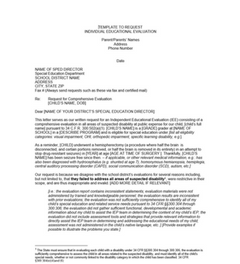What is an Independent Educational Evaluation (IEE)? You are entitled to an IEE. You must request one, pay for it, and respond promptly to it. This article will help you understand how to go about requesting one. The process of requesting an IEE is straightforward. First, you must request it from your school district. Next, you must select an Independent Evaluator. In some cases, you can work with your district to choose an Independent Evaluator.
You are entitled to an independent educational evaluation
You are entitled to an independent educational evaluation (IEE) if you believe that your child is not receiving the appropriate education for your child’s disability. Fortunately, due process laws require school districts to file paperwork when denied an IEE request. In addition to denying you an IEE, a school district may also deny you a due process hearing if they believe that the evaluation is not needed. While the school may push back on the IEE request, it is your right to file a due process complaint and have a hearing.
You must request one
You have a right to an independent educational evaluation (IEE) if you disagree with the results of a school-run evaluation. The IEE must meet the same standards as the school-run evaluation. It must also be done in a location that is comparable to the school. The school must give you information about the evaluator’s credentials, as well as the criteria used to determine the IEE. The IEE must be performed without unreasonable cost. If the school refuses, you can file a complaint with the CDE.
You must pay for it
The school system can refuse to pay for an IEE if it finds that it is inappropriate or has other concerns. In these situations, the school district may ask for a hearing to explain why the evaluation is not appropriate and why it should be conducted at the parent’s expense. If the hearing is unsuccessful, however, the school must still pay for the IEE. In most cases, the school district must pay for the evaluation unless it causes an unreasonable delay or the parent fails to provide adequate documentation for the need for one.
You must respond to it promptly
In most cases, you must respond to an IEE within 30 days. The report should include the procedures used, results and diagnostic impressions, and recommendations that are educationally relevant. The IEE can recommend appropriate placements for your child but cannot recommend a specific classroom or room. The IEE must meet certain standards in order to be considered valid and acceptable. Here are some examples of when you must respond to an IEE:
You must document your eligibility for one
Before you can request an independent educational evaluation, you must document your eligibility. This documentation will be necessary if you disagree with the evaluation that the school district conducted on your child. You must document your eligibility if you are seeking an evaluation for the first time, or if you are trying to get a second opinion on an assessment. In order to obtain an IEE, you must be at least six months from the date that you requested the evaluation.
You must obtain written consent from the parents
In order for independent educational evaluations to be conducted, parents must first provide their written consent. These letters should be sent to the principal of the school and to the special education coordinator of the district. If the parents do not give their consent, the school district cannot use any other method, including mediation, due process complaint, or impartial due process hearing. The consent letter must be signed by the parents and must specify the time period within which the evaluation will occur.
You must prepare for an IEE hearing
To get your child’s IEE, you need to be ready to argue your case to a third-party. You should be prepared to talk about your child’s disability, due process, and why an IEE is necessary. To help you prepare, contact your state’s office of disability rights. It will have a manual that outlines your rights and responsibilities. The following are tips that will help you prepare for an independent educational evaluation hearing.

